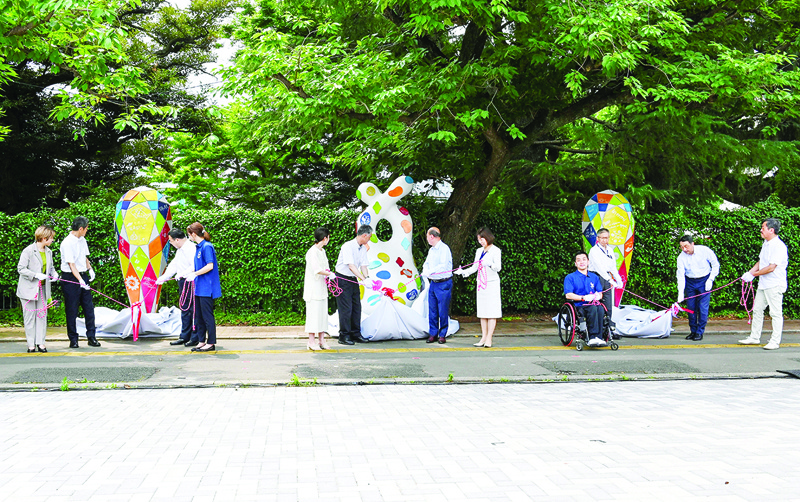 TOKYO: This picture shows the unveiling of the Tokyo 2020 Recovery Monuments, creations symbolizing the gratitude of the Japanese people and in particular those from Iwate, Miyagi and Fukushima - the prefectures worst affected by the 2011 earthquake and tsunami, during a ceremony in Tokyo yesterday. - AFP
TOKYO: This picture shows the unveiling of the Tokyo 2020 Recovery Monuments, creations symbolizing the gratitude of the Japanese people and in particular those from Iwate, Miyagi and Fukushima - the prefectures worst affected by the 2011 earthquake and tsunami, during a ceremony in Tokyo yesterday. - AFP
TOKYO: Tokyo 2020 was supposed to be the "Recovery Olympics," showcasing rebuilding after Japan's 2011 disaster, but a spectator ban has left Fukushima residents feeling their efforts were all in vain. Japan's bid for the Games specifically cited a desire to show the resilience of areas hit by the 2011 quake, which triggered a tsunami that killed more than 18,500 people and caused the Fukushima nuclear disaster.
The first event of the Games -- softball -- will take place in Fukushima, and it is also a baseball host venue. Initially, organizers had said a spectator ban in Tokyo and surrounding areas would not affect regions in northeastern Japan -- but Fukushima's hopes were dashed two days later, when the prefecture's governor said rising infections and pressure on hospital beds had prompted him to ban fans from events. William McMichael, a Canadian lecturer at Fukushima University who has worked for years to educate people about the region and its recovery, said the decision left residents wondering "what we can do".
"There's no way for us to help people understand what's going on in Fukushima," said McMichael, who has lived in the area since 2007. "That was the whole purpose, and it's all in vain now." Fans are currently allowed in limited numbers at other sporting events across Japan, and some Fukushima residents said the contradiction was difficult to understand.
"Things are really bad because of the virus, but I think at least kids should have been able to see some top-class baseball players," said Yumiko Nishimoto, who leads a community project to plant 20,000 cherry trees. "I would have liked them to have tried a little bit harder to find a reason to do it, rather than finding a reason not to do it."
Neighboring Miyagi prefecture, which is hosting the Games' football, is currently set to allow up to 5,000 fans. But local media reported Tuesday that the mayor of Sendai, the prefecture's largest city, has written to organizers asking for spectators to be banned there too.
'We're not giving up'
yesterday, three "Recovery Monuments" were unveiled next to the Olympic stadium in Tokyo, designed to "forge a connection" with the areas worst hit by the disaster. The brightly colored monuments stand over two meters tall and are partly made of aluminum recycled from temporary housing in the affected regions.
Athletes will pass the monuments going into the stadium, and can read the messages of support written on them, as well as write and attach their own. But some Fukushima residents believe the "Recovery Olympics" message has been lost as organizers focus on hosting the event safely during the pandemic. "I think the phrase 'Recovery Olympics' has been forgotten," said Hanae Nojiri, a reporter with a local Fukushima TV station. "I think people hesitate to talk about it because all the effort is going into tackling the virus."
Others are hopeful the message can still get through, with Nishimoto saying local children were brainstorming ways to share their stories of recovery. "We're not giving up on the idea of the Recovery Olympics," she said. "We've recovered a lot but we still have to recover more. We want people to see the reality of things here. Every day is the Recovery Olympics." - AFP
.jpg)
